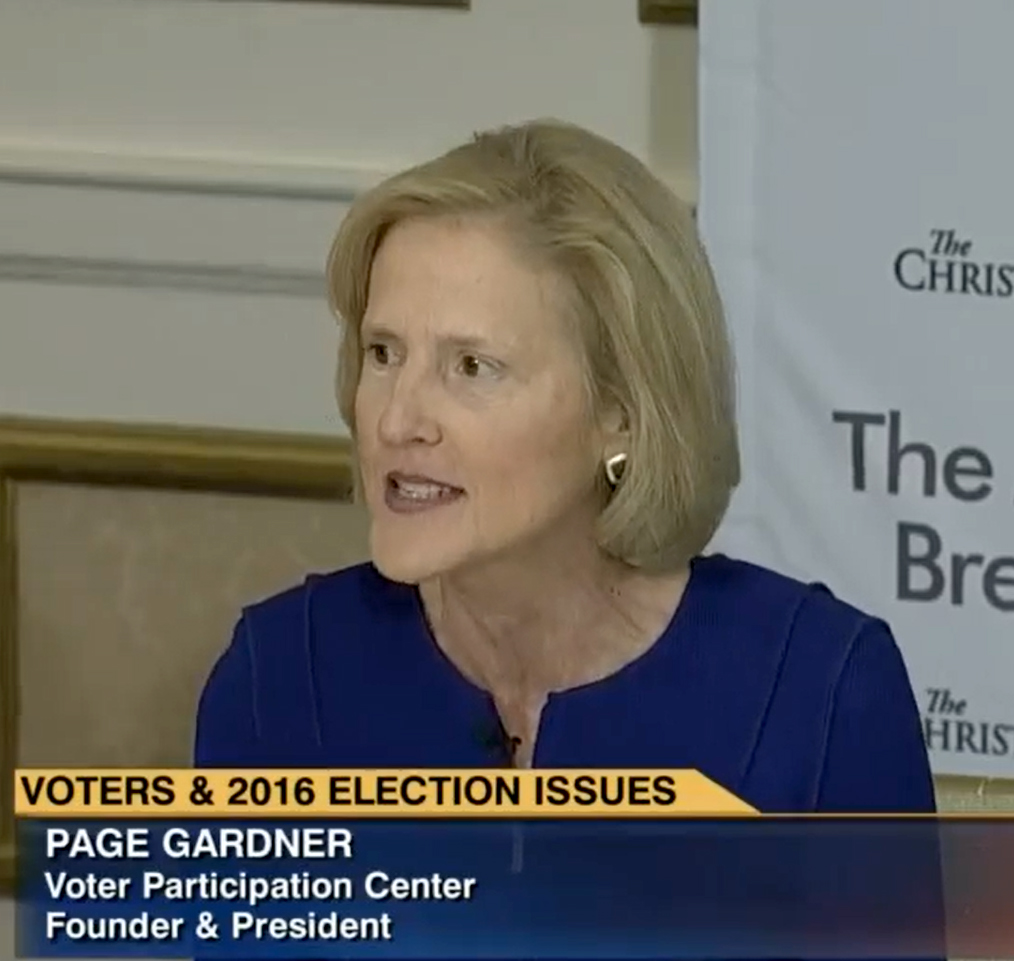Page Gardner is a left-of-center activist who founded the Voter Participation Center, formerly the Women’s Voices, Women Vote organization. Through her work, Gardner aims to register unmarried women to vote; unmarried women tend to vote Democratic.
Gardner worked for Bill Clinton’s 1992 presidential campaign and maintained professional ties to the Clintons. She attempted to register voters to help Hillary Clinton’s campaign in 2008; she faced criticism after Women’s Voices: Women Vote registration mailers in North Carolina went out after the primary election registration deadline, confusing some voters. 1
Gardner’s tactics to try and register people to vote have drawn criticism from elections officials all over the country. She has been accused of using misleading mailers among other things.
Early Life
Before founding Women’s Voices, Women Vote and the Voter Participation Center, Gardner worked on numerous Democratic and left-wing issue campaigns. In 1992, she worked for the presidential campaign of Bill Clinton. 2
In 2003, she founded Women’s Voice, Women Vote, now the Voter Participation Center. She would later on discover the “marriage gap” which showed there were differences between how married and unmarried women vote. It showed that unmarried women were more likely to vote Democratic than married women and that unmarried women were more likely to be unregistered to vote. 3
2008 Robocalls
In the 2008 Democratic presidential primary, Gardner commissioned robocalls encouraging people to register to vote in North Carolina. The April 2008 robocall targeted African-American voters and told them that a voter registration packet was on the way and encouraged them to fill out the packet in order to vote. The problem was the robocalls were sent out after the voter registration deadline had passed; the calls confused many people as to whether or not they were actually registered to vote for the Democratic primary. 4
Some people believed that the robocalls were an attempt to suppress voters inclined to support Barack Obama in order to help Hillary Clinton. Others pointed out the ties Gardner and her organization had with Hillary Clinton’s camp. President Bill Clinton’s former chief of staff John Podesta was a board member of Gardner’s organization. Hillary Clinton’s campaign manager Maggie Williams also served on the leadership team and she did consulting work for Gardner. 5
The left-wing Institute for Southern Studies investigated the group and found similar complaints in 10 states. It even found that the robocall ran word for word in Ohio. It found that there were complaints in every state the robocalls ran and they overwhelmed state election officials. Each time, Gardner’s organization would apologize. Chris Kromm, director of the Institute for Southern Studies, claimed there was no hard evidence indicating that the robocalls were meant to suppress the pro-Obama vote, stating, “we can’t show that there’s any formal or direct connection.” 6 However, the North Carolina attorney general believed the institute may have violated rules. 7
Controversial Voter Registration Letters
In 2016, the Voter Participation Center sent out letters in Colorado that said “Government Document enclosed” on the front. It also said that recipients were either 18 or about to turn 18 although at least some recipients were already registered to vote. Gardner defended the letters by saying that states do not keep lists of people who were not registered to vote and they had to create the list by other means. 8
In 2020, similar letters were sent out by the Voter Participation Center across the country. Many of the recipients believed the letters came from government agencies and not from an outside group. In addition, some letters were addressed to family pets. Some election officials believed the letter contributed to voter confusion. 9
References
- Overby, Peter. 2008. “Group With Clinton Ties Behind Dubious Robocalls”. NPR. https://www.npr.org/templates/story/story.php?storyId=90114863.
- Overby, Peter. 2008. “Group With Clinton Ties Behind Dubious Robocalls”. NPR. https://www.npr.org/templates/story/story.php?storyId=90114863.
- “Page Gardner”. 2020. Women’s Media Center. Accessed February 17. https://www.womensmediacenter.com/shesource/expert/page-gardner.
- Overby, Peter. 2008. “Group With Clinton Ties Behind Dubious Robocalls”. NPR. https://www.npr.org/templates/story/story.php?storyId=90114863.
- Overby, Peter. 2008. “Group With Clinton Ties Behind Dubious Robocalls”. NPR. https://www.npr.org/templates/story/story.php?storyId=90114863.
- Overby, Peter. “Group with Clinton Ties Behind Dubious Robocalls.” NPR, May 1, 2008. https://www.npr.org/2008/05/01/90114863/group-with-clinton-ties-behind-dubious-robocalls
- Overby, Peter. 2008. “Group With Clinton Ties Behind Dubious Robocalls”. NPR. https://www.npr.org/templates/story/story.php?storyId=90114863.
- Sexton, Betty. 2016. “Call For Action: Voter Participation Center Letters Confusing Voters”. KKTV. https://www.kktv.com/content/news/Voter-Participation-Center-letters-confusing-voters-393644531.html.
- Fessler, Pam. 2020. “A Big Vote Registration Push Reaches Millions — But Divides Elections Officials”. NPR. https://www.npr.org/2020/02/13/805694260/a-big-vote-registration-push-reaches-millions-but-divides-elections-officials.



